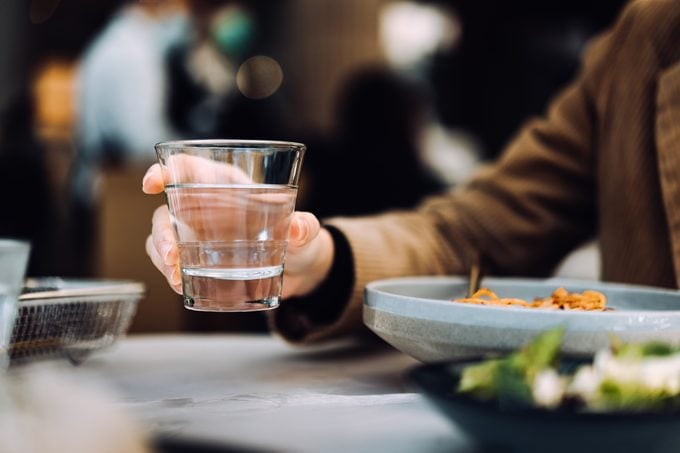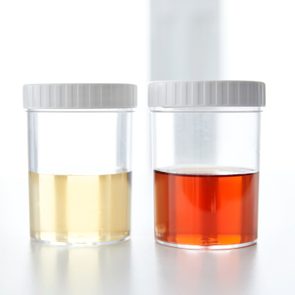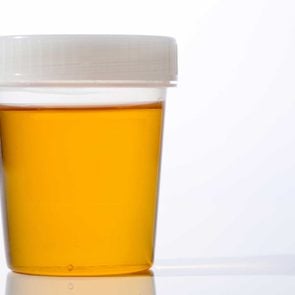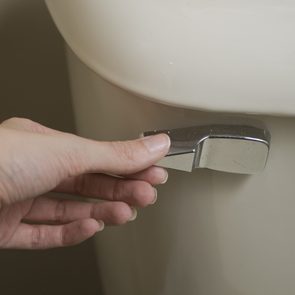8 Things That Can Cause Dark Yellow or Brown Urine
Updated: Aug. 23, 2021
Curious about what brown urine or brown pee means? Here are things that can cause this symptom, including certain foods and medical conditions.
Why is my pee brown?
You may be pretty used to seeing pale yellow urine when you flush, but what if your urine suddenly appears a shade or two darker?
Don’t panic when this occurs as there are some very easily remedied causes of dark yellow or brown urine, says Tolulope Bakare, MD, an assistant professor in the department of urology at UT Southwestern Medical Center in Dallas.
The color of your urine often provides telltale signs of your health. Clear urine is free of cells, debris, or particles.
What you eat and drink, any medication or supplements you take, as well as your underlying health can all affect the color, content, and consistency of your urine, Dr. Bakare says.
What is urine, anyway?
Urine is made predominantly of water, but it also contains sodium, potassium, and chloride, which are salts.
Other components include uric acid, a natural waste product from food digestion, and urea, a waste product made of ammonia and carbon dioxide.
The yellow color comes from urobilin, a waste product stemming from the breakdown of red blood cells.
But if the color is dark yellow or even brown, something else may be going on. There are lots of things that can cause this, Dr. Bakare says.
Here are the reasons why you might have dark yellow or brown pee.
Your food choices
If you notice that your urine has a darkish brown hue, think back to what you have eaten.
Fava beans, rhubarb, and aloe are all potential culprits, says Marisa Clifton, MD, an assistant professor of urology and the director of women’s health at the Brady Urological Institute at Johns Hopkins Medicine in Baltimore, Maryland.
This is nothing to worry about, she adds.

Your hydration status
Sometimes your urine may be a shade or two darker than usual because you haven’t peed in a while or aren’t drinking enough water, says Elizabeth Kavaler, MD, a urologist at Lenox Hill Hospital in New York City.
“If you urinate in the morning after not going all night, the urine has been in your bladder for hours and can be concentrated and appear darker,” she says.
The more water you consume during the day, the clearer and less concentrated your urine will be, she says. Pale yellow urine means you are well hydrated.
(Check out these 7 ways to stay hydrated.)
Your medications
Dark yellow or brown urine may also result from a medication you are taking. Examples include:
- An antimalarial drug
- Certain antibiotics
- A laxative containing cascara or senna
- The muscle relaxant methocarbamol
This is typically not a cause for concern, Dr. Kavaler notes..
Your hardcore exercise regimen
Addicted to CrossFit or your Peloton bike? If so, your intense workout regimen may also be to blame for dark urine, which can be serious, says Dr. Bakare.
Extreme exercise can trigger the breakdown of muscles known as rhabdomyolysis.
“This muscle tissue breakdown results in the release of a protein (myoglobin) into the blood from your kidneys,” she says.
Here’s a quick biology refresher: Your typical urinary tract consists of two kidneys, two ureters, a bladder, and a urethra (the tube that carries urine out of your bladder). Urine flows from the kidneys to the bladder.
Rhabdomyolysis can damage your heart or kidneys and can be potentially life-threatening, Dr. Bakare says.
Rhabdomyolysis may also result from traumatic injuries, illicit drug use, heat exposure, or supplements like creatine or ephedra.
Other signs of rhabdomyolysis include muscle weakness and/or muscle pain after exercise.
“If these symptoms occur with dark yellow or brown urine, see your doctor as soon as you can,” Dr. Bakare says.
Treatment typically involves increasing fluid intake. Sometimes intravenous fluids are needed.
(Here are 12 things your bladder secretly wants to tell you.)
Liver disease
There are some more nefarious causes of dark yellow or brown urine.
“Liver disease can dump a lot of bilirubin into urine which can make your urine a darker yellow or brown,” Dr. Bakare says.
Bilirubin is a yellowish pigment found in the bile that is produced by your liver. It travels through your liver, gallbladder, and digestive tract before leaving your body.
A healthy liver removes most of the bilirubin from your body, but bilirubin can leak into your urine if your liver is damaged.
This usually occurs in older people, Kavaler says.
If you have cirrhosis or scarring of the liver, your urine may appear dark yellow-orange or even brown, she says.
Other liver diseases such as hepatitis (inflammation of the liver) may also cause dark yellow or brown urine, she says.
Other signs of liver damage or disease may include jaundice (yellowing of the skin and eyes) and/or pale stools.
“It’s important to see your doctor if you notice any of these signs,” Dr. Kavaler says.
Treatment depends on the type and extent of your liver disease.
Sometimes, lifestyle changes such as cutting back on alcohol and losing weight can make a difference.
If the disease is advanced, medication or surgery may be needed. If you develop liver failure, a liver transplant will be required.
(Here are the 13 surprising ways you’re hurting your liver without even knowing.)
Gallbladder disease
Painful gallstones can develop if your body is already producing too much bilirubin due to a liver condition or if your liver is making too much cholesterol, causing darker urine.
Bilirubin can also build up when your gallbladder’s blocked, and this can cause urine to turn a dark brown.
Treatment for gallbladder disease may mean gallbladder removal surgery.
Kidney stones
Cola- or tea-colored urine could indicate inflammation of your kidneys, Dr. Kavaler notes.
If you see brown specks in your urine, it could be tiny kidney stones. While kidney stones can cause excruciating pain, tinier ones can often pass without notice.
Brown urine can also be old blood from your kidney or bladder that is still shedding in urine, she says. There are four main types of kidney stones, so save the stone, if you can, so your doctor can analyze it to help guide appropriate treatment and prevention strategies, according to the National Kidney Foundation.
Black urine disease
Also known as alkaptonuria, black urine disease is a very rare genetic condition that causes urine to turn black after air exposure.
Other signs include dark pigment in the connective tissues and skin, according to the National Library of Medicine.
This isn’t usually noticeable until people who have the condition are in their 30s. Other signs may include arthritis, heart problems, kidney stones, and prostate stones.
Next steps
If your urine is brown one day and then back to its usual pale yellow the next, it is likely no cause for concern, says Dr. Bakare.
“Anything that persists, worsens, doesn’t improve, and/or has associated symptoms like abdominal pain, nausea, or vomiting needs to be checked out,” Dr. Bakare says.
Your doctor can order a urine analysis test to get a better idea of what is going on, she says. These findings, along with a full physical exam, determine treatment and any other next steps.
Next, check out the causes of frequent urination.























